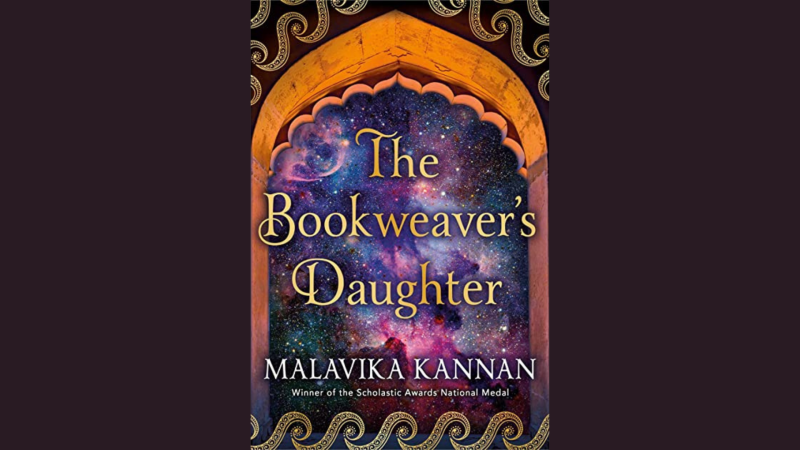“For a twelve-year-old writer who thought she wasn’t magical. This one’s for you.”
This dedication marks one of the first pages of “The Bookweaver’s Daughter,” the debut novel from Malavika Kannan ’23, who has written for The Daily. Both an author and an activist, Kannan is the creator of The Homegirl Project, a national organization geared towards empowering girls of color. She was also recently featured on Instagram’s official account, which described her book as a “feminist fantasy novel.”
Set in the fictional kingdom of Kasmira, the story of Reya Kandhari combines elements of magic, Indian mythology and sacrifice to produce a fascinating exploration of the power of female friendship and the dual nature of love.
Reya shoulders the legacy of being, as the title suggests, the Bookweaver’s daughter. Magic runs in her blood, including the power of vayati — “the art of weaving the Bookweaver’s words into reality.”
She lives under the reign of the tyrannical King Zakir, who outlaws magic and seeks to destroy the Mages and Yogis who possess the power. Reya and her father disguise themselves as peasants, and she works in the Fields to harvest mangoes.
When Reya’s father is killed and their hut burned down by imperial soldiers, she becomes the new Bookweaver, and Zakir’s newest target. In this defining moment, Kannan begins her dive into the complexities and contradictions of love, specifically in the friendship between Reya and Nina Nadeer.
On Reya’s first day in the Fields, a 9-year-old Nina declares, “I’ll take care of you from now on, if you want.” Although Reya keeps her true identity a secret throughout their seven-year friendship, their sisterly bond is still strongly established. She says, “There was something about Nina Nadeer that made me certain that scraped knees could be healed, rain storms could be weathered, and humans could leave their mark.”
While Reya and Nina care equally about each other, their manifestations of love often result in arguments and conflict. For Nina, standing up to the Zakir dynasty and protecting her friend go hand in hand: She immediately decides to flee the city with Reya instead of letting her go alone, refuses to betray the resistance in exchange for freedom and prepares to sacrifice herself to keep Reya and thousands of innocent citizens safe.
In one of the most poignant moments of the novel, Nina tells Reya, “I’d die for you… Not because you’re the Bookweaver, but because you’re my best friend. Because you are strong and brave and passionate. Because you’d do the same for me.”
However, Kannan adds layers and complexity to Reya’s character by pitting her responsibility to the Bookweaver’s legacy against her desire to protect Nina, and Reya feels intense guilt and shame over “sentencing her to a life on the run.”
Before Reya gains control over her magic, it erupts only in situations of intense fear and anger, often when Nina’s life is endangered. This saves them from Prince Devendra Zakir’s ruthless pursuit, but it is later abused once Reya is forced to learn magic in the mahal under Lady Sharati, one of the few Mages loyal to the king.
Sharati warns, “If you mention that peasant’s name, or disobey the king in any way, I shall see to it that she becomes dead in a very literal sense.”
Nina is used as collateral to keep Reya from attempting any kind of treacherous behavior; if Reya steps out of line, her friend will be tortured and killed. Instead of giving us an idealistic telling in which Reya stays consistently true to her principles, defiantly refuses to help Zakir and Nina miraculously survives unscathed, Kannan introduces the idea that some battles must be lost and some morals forsaken in order to keep our loved ones safe.
Under the close watch of Lady Sharati and Prince Devendra, Reya learns to control and harness her magic for the king’s ultimate goal: to use the power of vayati to “crush all rebellion and destroy the Mages, solidifying his control over Kasmira.”
At times, I was frustrated with what seemed like blindness on Reya’s part. How could she barely give a second thought to destroying the Bookweaver’s legacy and everyone who had sacrificed themselves for her? How could Nina’s life be worth more than those who might be inspired by her words to rise up from oppression?
However, this provides a darker and more dangerous depiction of the power of love: Our vulnerabilities can be used to hurt us, and it can be easier to stay safe and protect the people we love, rather than risking it all for the principles we share.
Reya herself acknowledges, “Wasn’t that exactly why I was sitting here, learning to perform vayati, prepared to let the world burn as long as Nina survived unscathed?”
At the same time, Kannan demonstrates beautifully how critical love can be when working through tragedy. Surrounded by the Renegades — rebels who support the Bookweaver and work to undermine the Zakir dynasty — Reya learns to bear her grief of her father’s death. She says, “In our pain, we were united.”
Perhaps the takeaway is that being truly brave and powerful means loving in spite of fear and the danger of vulnerability. In the book’s final scene, Reya only manages to embrace her identity as the Bookweaver — not just her powers, but her belief in freedom and pride in her legacy — through the support and bravery of her friends.
Although “The Bookweaver’s Daughter” is a fantasy novel, Kannan’s characters are unmistakably raw and real. Their inner struggles and wishes mirror those of her readers, and Reya’s nonlinear journey to finding herself is a clear example of how to prevail in spite of failures along the way.
By presenting love, friendship and vulnerability in all of its complexities, “The Bookweaver’s Daughter” shows us that allowing ourselves to fully step into our identities gives us the power to shape the world.
Contact Ellie Wong at elliew2 ‘at’ stanford.edu.
